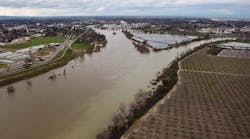by James Laughlin
Tulsa has a premier stormwater management system thanks in part to a flood on Memorial Day weekend in 1984. I remember that weekend well, having been personally caught up in the worst flood event in Oklahoma history.
I had just moved back to Tulsa that week after being away a few years. I set out on Saturday evening with a group of friends to celebrate my return, and barely noticed the light rain that had begun to fall. It was about midnight when I realized just how hard it was raining - and that it didn’t seem to be letting up.
Imagine if you will a storm that dumps up to 15 inches of rain in a matter of hours - and reaches it’s peak intensity at about 2 a.m. Sunday morning just as all the bars around town are closing for the night.
Happy drunks (including me) are forced out into a storm that has turned streets into raging rivers and underpasses into death traps. By dawn, 14 people had died and another 288 were injured. The flood damaged or destroyed nearly 7,000 buildings and left $180 million in damages (in 1984 dollars).
I was extremely lucky to make it home. My friends weren’t so lucky. They left a heart-beat ahead of me and drove down hill into a major intersection of two four-lane streets. When the hood of their car disappeared under the water I knew they were in trouble. They managed to wade free, but their car was a total loss.
I worked my way home taking back streets, cutting through parking lots and keeping to high ground wherever possible. It took three hours to drive five miles.
At the time, the mayor and street commissioner had been in office for only 19 days. But in the darkest hours of the city’s worst disaster, they pledged that such a disaster would never be repeated. Before daylight, they had assembled the city’s first Flood Hazard Mitigation Team to develop the city’s strategy.
Today, Tulsa’s floodplain and stormwater program is based on respect for the natural systems. It includes comprehensive watershed management, dedicated funds for maintenance and operation, a prototype alert system, and a $200 million capital improvements program.
Funding for the program is provided by a mix of city sales tax revenues, bond issues and a monthly stormwater fee included on the water & sewer bill. The fees are just under $5 for residential customers. Commercial/industrial fees are the same price for each “equivalency service unit” - 2650 square feet of property.
This program is more than flood control. The city has built parks in the floodplains, sports fields in stormwater detention basins, and greenway trails on creek banks. A very nice park near WaterWorld’s offices covers about a quarter square mile. It includes tennis courts, a Frisbee golf course and a winding, loop trail follows a quiet little creek through the park. I often go there on my lunch hour for walks.
Virtually the entire park is one big detention facility, although most park users probably have no clue. Even knowing the hidden function of the park, I can only imagine how it would look if Tulsa were ever hit with another 15 inch rain.
While I remember the storm well, I did refresh my memory by reading an article on the storm and it’s aftermath on Tulsa’s stormwater program website, www.cityoftulsa.org/CityServices/FloodControl/.
James Laughlin, Editor


